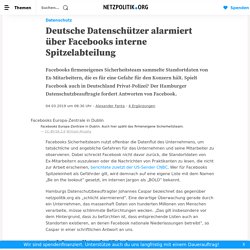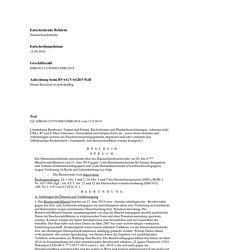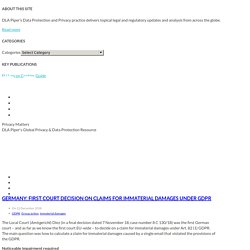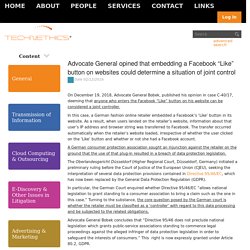

To receive this status the company must provide the customs authority with the tax identification numbers of the natural persons who are in charge of the company or exercise control over its management and who are in charge of the company’s customs matters. Also the details of the tax offices responsible for the taxation of these persons must be provided.
This data enables the authority to establish whether these natural persons have committed any serious or repeated infringement of customs or taxation rules or have any record of serious criminal offences relating to their economic activity.
The CJEU, applying the GDPR, concludes that such data processing has a legal basis, is adequate, relevant and not excessive and appears limited to what is necessary.
A nice illustration of how the Court applies the EU data protection rules.
The text of the ruling (C-496/17) can be found here:
German data protection authorities publish new guidelines for operating Facebook fanpages. Deutsche Datenschützer alarmiert über Facebooks interne Spitzelabteilung. Facebooks Sicherheitsteam nutzt offenbar die Datenflut des Unternehmens, um tatsächliche und angebliche Gefahren für das Unternehmen und seine Mitarbeiter zu observieren.

Dabei schreckt Facebook nicht davor zurück, die Standortdaten von Ex-Mitarbeitern auszulesen oder die Nachrichten von Praktikanten zu lesen, die nicht zur Arbeit erscheinen, berichtete zuletzt der US-Sender CNBC. Wer für Facebooks Spitzeleinheit als Gefährder gilt, wird demnach auf eine eigene Liste mit dem Namen „Be on the lookout“ gesetzt, im internen Jargon als „BOLO“ bekannt. Hamburgs Datenschutzbeauftragter Johannes Caspar bezeichnet das gegenüber netzpolitik.org als „schlicht alarmierend“.
Eine derartige Überwachung gerade durch ein Unternehmen, das massenhaft Daten von hunderten Millionen von Menschen verarbeite, müsse schlimmste Befürchtungen wecken. Auch Journalisten im Visier? Facebook macht kein Geheimnis daraus, dass es solche Methoden nicht nur am Stammsitz in den USA, sondern überall verwendet. RIS Dokument. Text GZ: DSB-D123.070/0005-DSB/2018 vom 13.9.2018 [Anmerkung Bearbeiter: Namen und Firmen, Rechtsformen und Produktbezeichnungen, Adressen (inkl.

URLs, IP- und E-Mail-Adressen), Aktenzahlen (und dergleichen), etc., sowie deren Initialen und Abkürzungen können aus Pseudonymisierungsgründen abgekürzt und/oder verändert sein. Offenkundige Rechtschreib-, Grammatik- und Satzzeichenfehler wurden korrigiert.] Die Datenschutzbehörde entscheidet über die Datenschutzbeschwerde von Dr.
. - Die Beschwerde wird abgewiesen. Rechtsgrundlagen: §§ 1 Abs. 1 und 2, 24 Abs. 1 und 5 des Datenschutzgesetzes (DSG), BGBl. A. 1. Die Beschwerdeführerin habe nunmehr zwei Jahre nach Abschluss des besagten Verfahrens mit E-Mail vom 25. 2. 3. 4. Germany: First court decision on GDPR. Homepage - Bundeskartellamt prohibits Facebook from combining user data from different sources.
Germany: First court decision on claims for immaterial damages under GDPR. The Local Court (Amtsgericht) Diez (in a final decision dated 7 November 18, case number 8 C 130/18) was the first German court – and as far as we know the first court EU-wide – to decide on a claim for immaterial damages under Art. 82 (1) GDPR.

The main question was how to calculate a claim for immaterial damages caused by a single email that violated the provisions of the GDPR. Noticeable impairment required On 25 May 2018, the plaintiff received an email from the defendant requesting his consent to an email newsletter. In Germany, this is considered spam and also a GDPR violation. The plaintiff claimed compensation for immaterial damages to the amount of € 500.00 from the defendant pursuant to Art. 82 (1) GDPR. The court dismissed the action because the plaintiff had already received an ex gratia payment of €50.00 from the defendant and a compensation for immaterial damage going beyond this amount was no longer reasonable. €50,00 times X?
German Competition Authority v FB. Germany v Facebook. Germany v FB Ad business. DPA Hamburg. DSGVO: Dutzende Bußgelder wegen Datenschutz-Verstößen. Advocate General opined that embedding a Facebook "Like" button on websites could determine a situation of joint control – Technethics. On December 19, 2018, Advocate General Bobek, published his opinion in case C-40/17, deeming that anyone who enters the Facebook “Like” button on his website can be considered a joint controller.

In this case, a German fashion online retailer embedded a Facebook’s ‘Like’ button in its website. As a result, when users landed on the retailer’s website, information about that user’s IP address and browser string was transferred to Facebook. The transfer occurred automatically when the retailer’s website loaded, irrespective of whether the user clicked on the ‘Like’ button and whether or not she had a Facebook account. A German consumer protection association sought an injunction against the retailer on the ground that the use of that plug-in resulted in a breach of data protection legislation.
In particular, the German Court enquired whether Directive 95/46/EC “allows national legislation to grant standing to a consumer association to bring a claim such as the one in this case.”